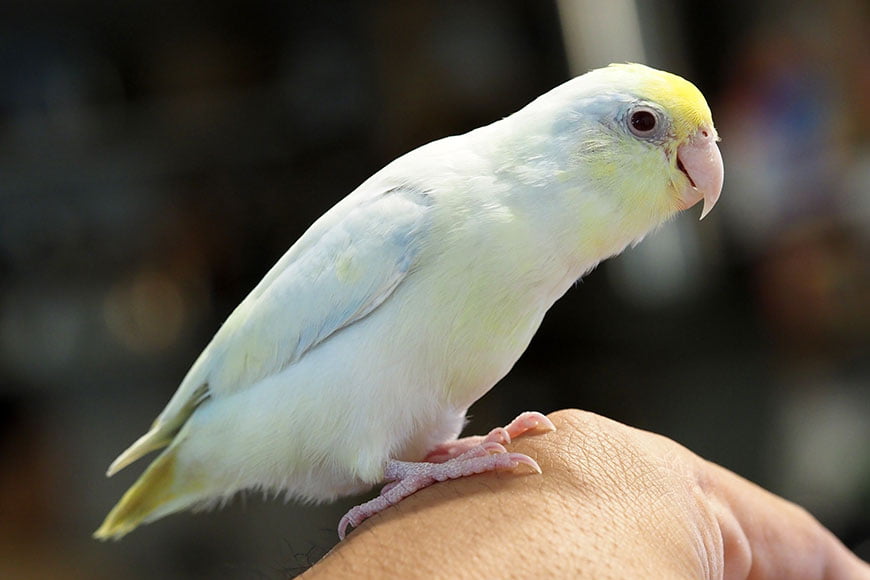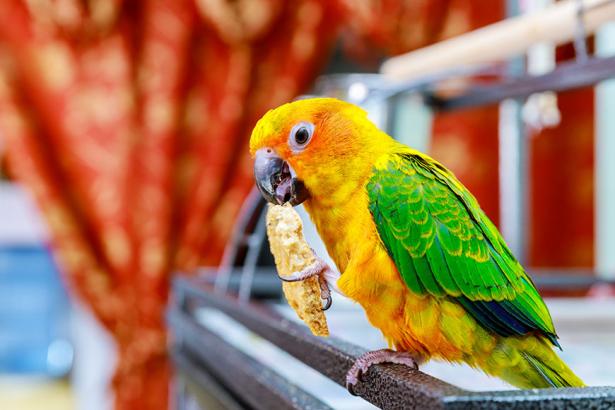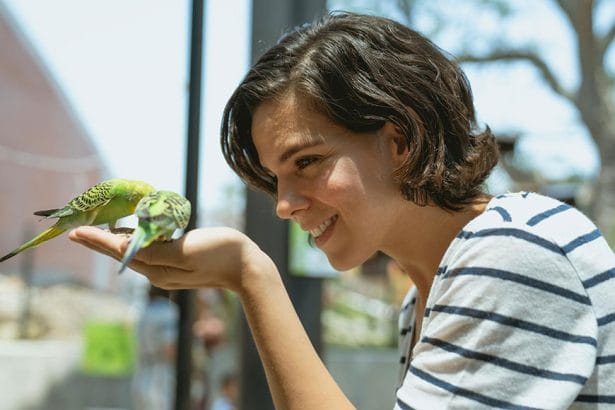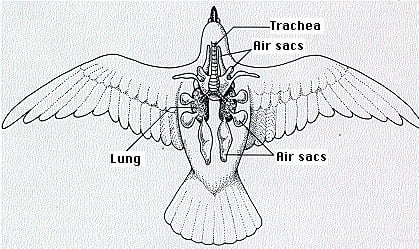When our pet cats and dogs become sexually mature, we can prevent them from mating and breeding by having them castrated or spayed. However, we don’t routinely desex birds as the procedure is expensive, can be risky and is usually only undertaken in female birds with gynaecological problems Therefore our pet birds will have a sex life whether we want them to or not.
Most pet bird owners fail to understand that their newly acquired, hand-reared, pet will grow and develop like a young child. Just as a child grows and matures through the various stages of development to reach sexual maturity, so will the pet bird. The cute, young, cuddly, baby bird will reach puberty and undergo hormone induced behavioural changes just like their human, adolescent counterpart. I commonly get calls from unhappy cockatiel owners. Their sweet little bird has started to bite and be aggressive and demanding. These behavioural changes in cockatiels usually occur between nine months to one year of age. They correspond with the bird reaching puberty.
When birds become sexually mature, their instinct is to find a mate. Birds don’t have ‘casual sex’. They choose and court a mate, select or build a nest and have sex for procreation rather than recreation. If there is no ‘feathered’ mate to choose from the bird will choose a mate from the ‘human flock’ (i.e. one of the family members). Many behavioural problems induced by sexual frustration occur when a pet bird chooses a human as his/her mate. When pet birds are inappropriately bonded to a human mate, they become frustrated because the human mate cannot fulfil the role of mating or laying or sitting on the eggs. In these circumstances birds can be driven by sexual frustration to feather picking or even self-mutilation (where skin and soft tissue is chewed). They masturbate and can become aggressive and dominant towards other family members that they perceive of as a rival.
Female birds that are inappropriately sexually stimulated by their owners (eg on the shoulder, kissing, feeding from the mouth etc.) can become chronic egg layers. Chronic egg laying can cause uterine prolapse, egg yolk peritonitis, malnutrition from the depletion of the body stores of calcium and other nutrients and many other problems associated with female reproductive organs and ‘secret women’s business’.
Therefore, it is very important for the humans associated with the pet bird to always act as a parent or ‘older bird’ to the pet rather than as a lover or a mate. I always tell owners that they should never become a ‘birdophile’ in their relationship with their pet. Just as there are appropriate and inappropriate ways of handling pet birds. In other words, owners should not touch or handle their pet bird in inappropriate or sexually suggestive ways. They should never allow the bird to eat out of their mouths or stroke it on the lower back or abdomen if the bird is presenting. These types of behaviours are ‘birdy foreplay’ and encourage sexual and mating behaviour in the bird.
Seasonal changes also trigger the sexual instincts of pet birds. In the wild, heavy rain after a prolonged dry spell will indicate to birds that there will be abundant food supplies to support a clutch of offspring. Abundance of food and longer daylight hours signal the appropriate time for breeding. Recently, the prolonged drought has caused unnaturally dry conditions that have mimicked the natural environment of many inland Australian birds. The onset of spring rains after the period of drought has stimulated many single pet female cockatoos or galahs to lay eggs. I have received many calls from surprised owners of 20 to 30 year old sulphur crested cockatoos or galahs that have suddenly laid an egg in response to these conditions.
Spring time is the mating time for many species of birds. As a result of increased hormone levels in spring, birds may show behavioural changes. Males can become more ‘pushy’ and aggressive. Females become more cuddly and amorous, ‘presenting’ to their owners. Owners need to be aware of the reasons for these seasonal hormonal changes in their pets.
It is natural for a bird to reach puberty and choose a mate. It is unnatural for pet birds to be isolated from their own kind and restricted to a caged environment. Well-meaning owners often provide a mirror for company. This is the worst thing that they can do. The sexually frustrated, single pet bird will often try and ‘bond’ with his own reflection in a cage mirror. ‘Randy Budgie Syndrome’ is a recognised medical condition where a single, pet, male budgie endeavours to maintain a sexual relationship with his reflection. He masturbates on his perch or cage toys and regurgitates food to his reflection. Some owners consider this activity as a form of entertainment, while others find it distressing. Such activity on a constant year round basis can lead to digestive and hormonal disturbances. Frustrated, single pet birds will often engage in stereotypic and obsessive compulsive behaviour. Some birds will continually pace up and down the length of their cage. Others will acquire a ‘drinking problem’. This is a form of displacement activity where the frustrated bird channels its sexual urges into an obsessive compulsive activity such as excessive drinking.
The obvious way to counteract aberrant sexual behaviour in pet birds is to introduce a mate of the opposite sex. There are many ‘old wives’ tales’ about having a mate for a pet bird. The most common misconception is that your bird won’t be tame or talk if it has a mate. This erroneous idea has been disproved so many times. Instead of having one friendly little bird, you have two (provided recognised training and behaviour is applied). When birds have mates of the opposite sex, they have a natural outlet for their sexuality when they become sexually mature. Many owners are horrified when I suggest this. “We don’t want our bird to have babies” is the common response. However, there are forms of ‘birth control’ that can be introduced. The important aspect from the bird’s point of view is that they can pair bond with another bird and undergo normal sexual activity. If an when they do mate and lay eggs, the eggs can be boiled to prevent any potential chicks hatching, while still allowing the parent birds to undergo the whole cycle of laying and sitting on the eggs. It is important to leave the boiled eggs in the nest for the incubation period. If the eggs are removed, it will stimulate the female to lay another clutch.
Owners need to have an understanding of bird sexuality as sexual frustrations and inappropriate bonding with owners can result in aberrant behaviour that will affect the bird’s physical and mental health and its relationship with its ‘human flock’.
Information supplied by (c) Currumbin Valley Vet Services August 2010
FAQs
In the wild, dominance can be a common occurrence in bird colonies, especially when one bird begins to consistently achieve its goals at the expense of others. When looking at why certain birds become dominant in captivity, it’s important to understand that the bird sees you as part of the flock. You need to be confident so the bird sees you as its leader. Usually birds will attempt to assert or ascertain dominance during their adolescent period. If you are having trouble with your bird then you should contact an exotic pet vet and ask for advice.
Yes. When birds reach puberty, they undergo a number of physical changes that can be both interesting and confusing. Their wings may grow larger, their beaks may change colour and shape, and their feathers may become more pronounced. There are even some birds that can start singing at this stage! On the other hand, puberty is often the stage where your bird may become naughty and attempt to establish dominance as they would in the wild. If you are having issues with this then you should do an online search for vets near me for birds to find a vet that can advise you how best to approach the issue.
When you see a bird that is hormonal, it is usually easy to tell. These birds will usually be in a more excitable state and may be more active. Their plumage may also be different, with brighter colours and more pronounced patterns. Additionally, they may have a more pronounced posture, with their head held high or pushed forward. They may also become irritable and begin to bite or even hump their owner. If you are experiencing problems with behaviour then it is best to find an exotic pet doctor if you do not already have a regular avian vet. They will help you to understand how best to train your avian friend during this period.






ive had my budgie for 7 years. in 2020 he became hormonal mess. he NEVER used to be like this but now its like hes lost his mind completely. in the spring i have to move his cage to a quieter place in our house(still gets lot of traffic, but less noise from tv, computers, me and my husband, ect). before i figureed out what was going on with him he was screaming nonstop for hours. Moving him to the quieter space has improved his condition greatly. just hoping he’ll cool down by summer because hes being very obssessive.
I normally lelt him have free flying time because he needs exercise. but its been impossible lately because he flies back and forth between his cage and my computer. it would be fine if he perched, but he wont perch. feels like a swarm around me as he flies around. its driving me up the wall. I don’t want a second bird because last time I had one, he was very aggressive to it. maybe i should of took that as a sign he was going to be an asshole when he grew up.
So how do you get a bird out of the stage of wanting to mate with you my bird is a nightmare with it all and its just constant at the moment its hard to deal with i just need to know how to try deal with it now as she is getting worse and worse temperament wise also could someone contact me with help?
My bird demands to scratch his “butt” specifically on my hand or my finger… I wasn’t fully aware of what he was doing for a while until doing some research and finding out this mating behavior… Sometimes I’m not even aware that he’s even flown to my hand! He also never stops screaming until I open the cage for him to go do his business… what do I do!
I have a 2.5 yr old male budgie who is a very happy, healthy little fellow who constantly wants to have sex with me if he is sitting on my hand. He prefers my head but will only stay there a minute and won’t sit on my shoulders for more than seconds. He will actually ejaculate on my hand if I let him which I have only done a couple of times. I will always stop this behavior by moving or flicking him off. I’ve had many parakeets in my life and have never had one like this. He does a bit of regurgitating when he gets excited like that. But it doesn’t seem to be affecting him in any negative way. He also eats his poops if I don’t catch them right away when he is out of his cage. Such an odd little character, sings all the time and very friendly. Any thoughts on all of this? Thank you.
I have a 12 month old hanhs Macaw and she is ready to mate. Unfortunately, I also have a 2 year old Meyers parrot and she is trying to bully him into mating. He seems disinterested and it’s driving my female insane. Now, she tries to mate with me too. Help, I don’t know how to ease her frustration.
I have a 20-year-old female Bare Eyed cockatoo named Ozzie.
Not knowing much about females, I loved her, I petted her and I sang and danced with her and now she thinks I’m her mate and has laid 4 eggs In 3 weeks.
My vet told me to move her to a dark room, keep her caged in the dark for 14 hours, And artificial light for 8 hrs per day for 14 days to stop the laying cycle.
Ozzie is very unhappy and screaming, dark or not. She does settle after a bit…but very unhappy, not eating much since I moved her. She’s ignoring her eggs. She laced 3 from the perch, but last one on the ground of her cage. She was so lovely and social and now she’s mad and I feel horrible. What do I do now? Do I really keep her in the dark with no outings for 14 days?
I have an African grey whom laid 3 eggs at the beginning of June. We were told to not show her affection and to kinda ignore her so she would stop laying. That worked but she’s still sitting on them. Early today when I was cleaning out her cage I noticed she’s been plucking. What do I do now to stop her from plucking and how long will she keep sitting on her eggs?
I have an Lesser Sulfur Cockatoo who had plucked the bottom part of her legs. She has don’t this 2 months ago when they start to come back She starts plucking again, shortly afterwards it seems. I don’t know why or what to do. Please help.
Lol
I would like to talk with someone about my cockatoo
I have two male budgies. One older than the other. The last edition I found him in my garden and took him in after trying to find his owner with no luck.
I have no idea how old this second budgie is or any background of his life.
He has become very obsessive and dominant and tries to bite my other lay back budgie and take over.
The second budgie has tried to have sex with my hand and even tried to bite my lip very aggresively.
On reading the above. That is my second budgie Benny to a T.
I got that way yesterday, Benny tried to bite me around my neck area again. I segregated Benny into a cage on his own. As Buddy my other bird has been putting up with a lot of obsessive behaviour and biting.
It seems Benny wants a girlfriend and yes, I am not willing to get a third bird being female to have baby budgie. Benny I believe thinks I am his girlfriend. As he is friendly and wishes to mount my hand every time he gets out.
I believe his nasty biting behaviour is that Benny is frustrated that I don’t do the same back to him and have sex.
Thank you for your article … it was exactly what I needed to read… and yes, I have learnt why Benny does that behaviour to me… and also some strategies I will stop doing … as I was rubbing his chest and that got Benny aroused.. it is a no no.